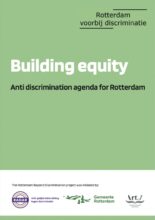Building equity – Anti discrimination agenda for Rotterdam
In the period from October 2021 to January 2023, people from the Black, Jewish and Islamic communities1 in Rotterdam engaged in 18 group discussions about their experiences with discrimination and racism2. They discussed these initially within their own community (bonding) and then together with those involved from the other two communities (bridging). By doing so, they wanted to strengthen their social capital (to what extent does one have networks that can provide support and help or that can help them get ahead in life?). Then as ambassadors of “Rotterdam beyond discrimination” they engaged in a dialogue with managers and professionals from institutions in Rotterdam in the field of local administration, education, media and the (socio)cultural domain about their experiences and interests (linking).
The experiences of these ambassadors with discrimination and racism are pervasive and affect human dignity and the right to safety. The United Nations defined Human Security in 2005 as: the right of people to live in freedom and dignity, free from fear, free from want and free from humiliation. In Rotterdam, this is not secured for these three communities.
Experiences of discrimination and racism occur on a daily basis throughout the city and have great impact on the victims and their communities. They are experiences that lead to ongoing stress and to loss of self-esteem and autonomy. They tear people and communities apart and put them in a situation of structural volatility of existence that is sickening and leads to conflict, disadvantage, poverty and marginalization. Prejudice leads to othering: people considered as ‘others’ are seen only as deviant and threatening. This erodes social cohesion of the city.
More than 150 inhabitants of Rotterdam participated in the meetings. They were part of the project ‘Rotterdam beyond discrimination’ by RADAR, Art.1 and the municipality of Rotterdam, with financial support from the European Union. Based on their discussions, the ambassadors drew up an action agenda to address discrimination and racism in four domains.
